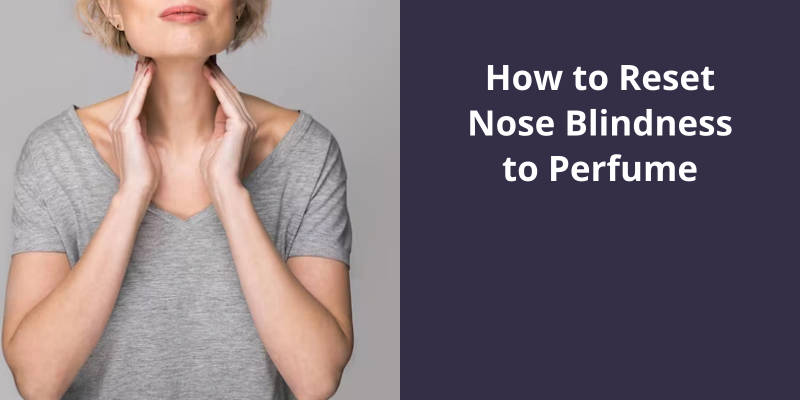Are you tired of not being able to smell your favorite perfume as soon as you apply it? Have you experienced the frustrating phenomenon of nose blindness, where your sense of smell seems to disappear when it comes to certain scents? Fear not, as there are ways to reset your nose and regain your sensitivity to perfume. One of the simplest methods is to give your nose a break. Just like any other sense, your olfactory system can become fatigued and overwhelmed by constant exposure to a particular fragrance. By taking a break from wearing perfume, you allow your nose to recover and reset. This can take a few days or even a week, but rest assured, your sensitivity to your signature scent will soon come back. In the meantime, there’s a secret weapon you can use to help reduce nose blindness – coffee beans. The strong, aromatic scent of coffee can help cleanse your olfactory receptors and clear any lingering fragrances. Simply place a jar of coffee beans in your room or near your perfume collection, and allow the aroma to work it’s magic. So, if you're looking to reset your nose and avoid nose blindness to perfume, give yourself some time and make friends with coffee beans – your olfactory system will thank you!

How Long Does It Take to Reset Nose Blindness?
How long does it take to reset nose blindness? Same with olfactory fatigue, you should relax and rest your nose for a little while. Your sensitivity to your signature scent will soon come back if you give it ample time to recover. Give it a few days or even a week. For sure, your nose blindness will go away with time.
Nose blindness, or olfactory fatigue, is a common phenomenon that occurs when you’re exposed to a fragrance for an extended period of time. It isn’t a permanent condition, but rather a temporary loss of sensitivity to a particular scent. Like any other sensory organ, your nose needs time to rest and recover after being overstimulated.
During this recovery period, it’s important to avoid further exposure to the scent that caused your nose blindness. This means refraining from wearing or using any perfumes, colognes, or scented products that may contain the same fragrance. By giving your nose a break from the scent, you allow it to reset and regain it’s sensitivity.
In addition to allowing your nose to rest, there are a few other things you can do to help reset your nose blindness. First, try smelling something with a strong, distinct scent, such as coffee beans or freshly cut citrus fruits. This can help clear your nasal passages and refresh your sense of smell.
Another trick is to switch up your scent routine. If you usually wear the same perfume every day, try using a different fragrance for a while. This change can help prevent your nose from becoming desensitized to a specific scent and can also make your signature fragrance more impactful when you return to it.
Finally, make sure you’re taking care of your overall health and well-being. Eat a healthy diet, stay hydrated, and get plenty of rest. A healthy body and mind can enhance your sense of smell and improve your overall sensory perception.
Can you reset your smell? According to SALLE PRIVÉE’s fragrance chemist and perfume specialist, Tanja Deurloo, one simple way to reset your smelling palette is by smelling your own skin. By being in tune with your own natural scent, your nose becomes primed and ready to appreciate the intricate complexity of fragrances.
Can You Reset Your Smell?
Can you reset your smell? According to SALLE PRIVÉEs fragrance chemist and perfume specialist, Tanja Deurloo, one effective way to reset your smelling palette is by smelling your own skin. By taking a moment to focus on and sense your own skin scent, your nose is able to recalibrate and become ready to perceive and experience the complexity of fragrances.
Our sense of smell is a powerful tool, but it can become overwhelmed and desensitized over time. We may find ourselves unable to detect the subtle notes and nuances of perfumes that once captivated us. In order to reset this “nose blindness,” Deurloo suggests starting with something familiar – our own skin.
Deurloo emphasizes the importance of slowing down, consciously focusing on the scent, and allowing ourselves to engage with it fully.
By doing this, we give our nose the chance to recalibrate and distinguish between different scents again. It’s almost like hitting a reset button, giving ourselves a fresh start in our olfactory journey. Once we’ve reconnected with our own skin scent, we can then move on to experiencing the complexity of perfumes with renewed sensitivity and appreciation.
Can you undo nose blindness? While it might be essential for normal brain function, nose blindness can be stressful if you want to keep your home smelling clean for guests. One way to temporarily reverse nose blindness is by leaving and re-entering the area where the smell is present. However, there are other techniques and products available that can help tackle this issue more effectively. Let’s explore some of them below.
Can You Undo Nose Blindness?
Have you ever wondered if there’s a way to reset nose blindness to perfume? Nose blindness, also known as olfactory fatigue, refers to the temporary inability to detect certain smells. While it’s a natural phenomenon that allows our brains to focus on new scents, it can be quite frustrating if you want to keep your home smelling fresh and clean for guests. Thankfully, there are a few simple tricks that can help you temporarily reverse nose blindness and appreciate the scent once again.
When we continuously expose ourselves to a certain smell, our olfactory receptors become desensitized, making it harder for us to perceive the odor. By physically removing yourself from the area and giving your nose a break, you allow your olfactory receptors to reset and become more sensitive to the scent once you re-enter the space.
Maintaining good air circulation in your home can also help combat nose blindness. Opening windows or using fans can help disperse the smells and prevent your nose from becoming overwhelmed by a particular scent. The movement of air can carry away the odor molecules and refresh the environment, making it easier for your nose to pick up on the scent again.
If you’re experiencing chronic issues with nose blindness, it may be helpful to keep a regular cleaning schedule and maintain good hygiene practices. Regularly cleaning your home, washing your fabrics, and ensuring proper ventilation can help eliminate potential sources of unpleasant odors, reducing the frequency of nose blindness.
By implementing these strategies, you can ensure that your home smells fresh and inviting, even to guests who may not be affected by nose blindness.
Differentiating Between Temporary and Permanent Nose Blindness
- Temporary nose blindness occurs when the sense of smell is temporarily impaired, often due to congestion, allergies, or colds.
- Permanent nose blindness, on the other hand, refers to a more long-term or permanent loss of smell, which can be caused by various factors such as aging, certain medical conditions, or exposure to toxins.
- Temporary nose blindness is usually reversible and can be improved with appropriate treatment or remedies, such as decongestants, nasal sprays, or antihistamines.
- Permanent nose blindness, unfortunately, may be irreversible in some cases, depending on the underlying cause. It’s important to consult a medical professional for proper diagnosis and management.
- Temporary nose blindness can significantly impact one’s ability to taste and enjoy food, as our sense of taste is closely linked to our sense of smell.
- Permanent nose blindness, besides affecting taste, can also have implications for safety and quality of life, as it may hinder the detection of potentially harmful odors or indicate underlying health issues.
- Both temporary and permanent nose blindness can vary in severity, with some individuals experiencing a partial loss of smell, while others may lose it completely.
- While temporary nose blindness is more common and often a temporary inconvenience, permanent nose blindness can have significant implications and may require medical intervention or lifestyle adjustments.
Source: How to prevent nose blindness, or at least reduce it…
From there, they can continue smelling different scents without any residual fragrance interfering. Additionally, taking a break and exposing yourself to fresh air can also help reset your nose and restore your sense of smell. So the next time you find yourself overwhelmed by the intensity of a perfume, remember these simple techniques to reset your nose and enjoy the fragrance experience to it’s fullest.
How Do You Reset Your Nose After Smelling Perfume?
To reset nose blindness to perfume, one effective method is to use the elbow as the reset tool. This technique, widely recognized and practiced in the perfume industry, has proven it’s effectiveness over time. Rabuchin, an expert in the field, confirms that perfumers use this method to reset their olfactory system. The crook of the elbow serves as a perfect baseline for comparison since individuals are constantly becoming accustomed to their own scent.
By inhaling the scent of ones own skin, which remains relatively neutral in terms of fragrance, the olfactory system can recalibrate itself. This method helps to minimize the effects of smelling multiple perfumes consecutively, which can lead to nose blindness or the inability to accurately detect and differentiate between scents.
Moreover, the elbow method helps to refresh the senses and reduce olfactory fatigue. Often, when exposed to an overwhelming number of scents, the nose becomes desensitized, leading to the inability to perceive subtle differences in fragrances.
Allowing the nose a few moments to rest and recover from the continuous exposure to different scents can help restore it’s ability to accurately perceive fragrances. This practice is especially useful in situations where individuals are testing multiple perfumes or attending fragrance events where numerous scents are being showcased.
Lastly, incorporating techniques such as smelling coffee beans or citrus fruits can assist in resetting nose blindness. These strong and distinct scents can help cleanse the olfactory system, allowing the nose to start afresh and accurately detect perfumes. These techniques are commonly used by professionals in the fragrance industry, as they provide a quick and efficient method to reset the nose and enhance the olfactory experience.
Whether youre a perfume enthusiast or a professional in the fragrance industry, these techniques can help you fully appreciate and enjoy the wide array of scents available.
The Science of Olfaction: Exploring How the Nose Detects and Processes Different Scents.
- The olfactory system is responsible for detecting and processing different scents.
- It starts with the nose, which contains specialized cells called olfactory receptor neurons.
- These neurons are located in the olfactory epithelium, a small patch of tissue inside the nasal cavity.
- When we smell something, molecules from that substance enter the nose and bind to the olfactory receptors.
- This binding triggers a signal that’s sent to the brain, specifically to the olfactory bulb.
- In the olfactory bulb, the signals are processed and interpreted, allowing us to identify and differentiate different smells.
- Interestingly, the olfactory system is closely linked to our memories and emotions.
- Smells can evoke vivid memories and strong emotional responses.
- Research has also shown that our sense of smell plays a role in taste perception.
- Without it, we’d not be able to fully appreciate the flavors of food and beverages.
In addition to these options, there are also other potential treatments such as surgery, medication adjustments, or addressing underlying medical conditions that may be affecting your sense of smell. Consulting with a healthcare professional is crucial to determine the best course of action based on your specific situation. Understanding the cause behind your loss or alteration of sense of smell is key to finding an effective solution and potentially restoring this important sensory function.
How Do You Cure a Nose That Can’t Smell?
There are various ways to reset nose blindness or anosmia, the condition where one can’t smell properly or at all. One common approach is to treat the underlying cause, which may restore the sense of smell over time. For instance, if the anosmia is caused by conditions like sinusitis or nasal polyps, using steroid nasal sprays or drops can be beneficial. These medications help reduce inflammation in the nasal passages and sinuses, allowing the sense of smell to return to normal.
Another promising treatment option is smell training, which involves systematically exposing oneself to different scents on a regular basis. This type of therapy aims to retrain the brains olfactory system and improve the sense of smell. Smell training typically involves sniffing essential oils or other strongly scented substances, such as coffee beans or spices, for a few minutes each day. By repeatedly stimulating the olfactory receptors, the brain can gradually regain it’s ability to detect and identify different smells.
In addition to these treatments, it’s important to address any lifestyle factors that might contribute to nose blindness. Avoiding exposure to strong chemical odors, smoke, and other irritants can prevent further damage to the olfactory system. Keeping the nasal passages moisturized and clear by using saline nasal sprays or rinses can also promote a healthy sense of smell.
It’s worth noting that the recovery time for nose blindness varies from person to person. Some individuals may regain their sense of smell within a few weeks or months, while others may require longer-term monitoring and treatment. It’s essential to consult with a healthcare professional who can provide personalized guidance and recommend the most appropriate treatment options based on the individuals specific situation.
Natural Remedies for Anosmia: This Topic Could Discuss Alternative or Complementary Therapies That May Help Improve the Sense of Smell. It Could Include Information on Herbs, Supplements, or Other Natural Remedies That Some People Have Found Helpful in Restoring Their Olfactory Function.
Natural remedies for anosmia, also known as nose blindness, can be helpful in restoring olfactory function. Alternative or complementary therapies may improve the sense of smell for some individuals. This can include the use of herbs, supplements, or other natural remedies. While these remedies may not work for everyone, they’ve been found to be effective for some people in resetting nose blindness to perfume. It’s important to note that consulting with a healthcare professional is recommended before trying any natural remedies for anosmia.
Conclusion
By taking a break from the scent and allowing a few days or even a week for your nose to reset, you can regain sensitivity to your signature scent. Placing a jar of coffee beans in your room can help refresh your olfactory system and revive your ability to detect and enjoy the fragrances around you. So, embrace the power of time and the aroma of coffee beans to reset your nose and rediscover the magic of perfume.





